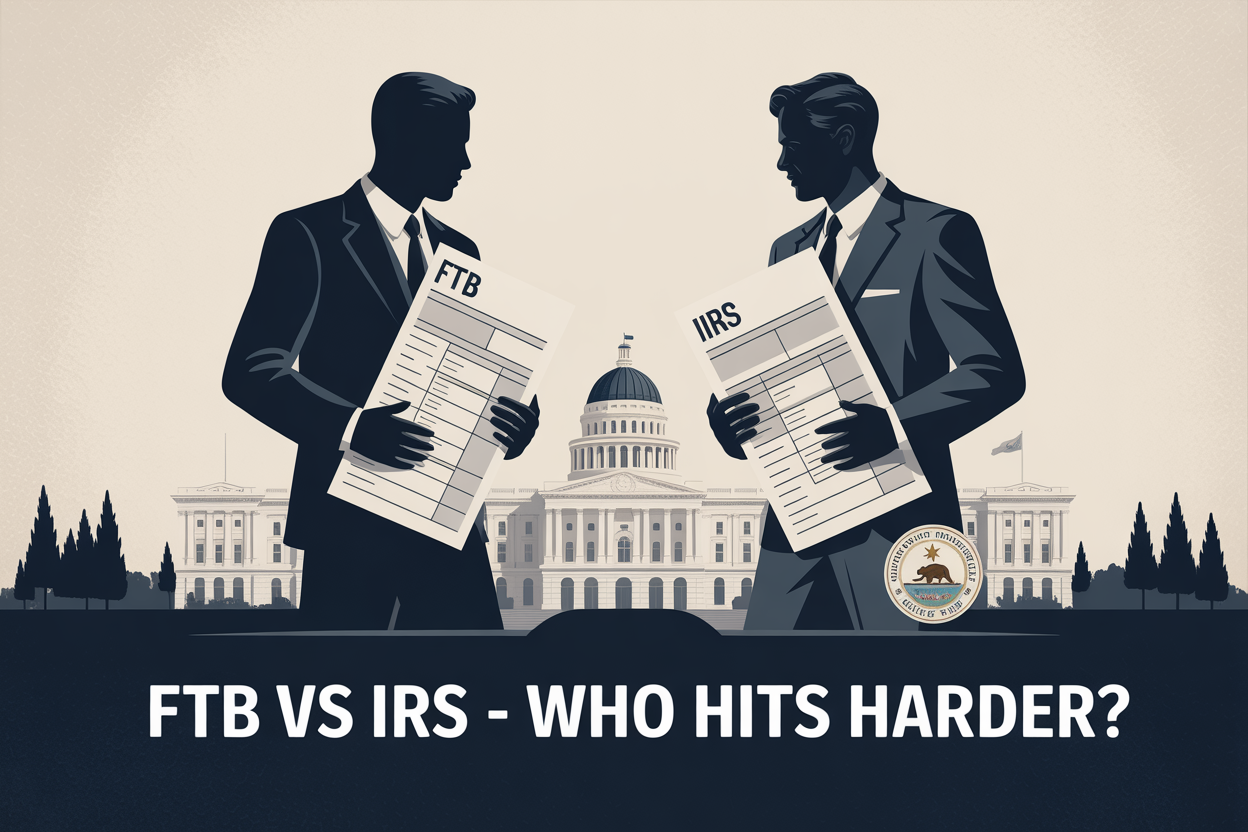FTB vs IRS – Who Hits Harder in California?

If you're behind on taxes, you might assume the IRS is the most aggressive collection agency out there. But in California, you also have to contend with the Franchise Tax Board (FTB) — and they play by their own rules.
So which one should you worry about more?
The IRS may be larger — but the FTB is faster, more automated, and often more relentless when it comes to California taxpayers.
In this guide, we’ll compare:
- How each agency enforces collections
- Who’s faster to levy your bank account or garnish wages
- Which offers better resolution options
- How they coordinate against you
- What you can do to stop both
IRS vs FTB – Side-by-Side Comparison
| Category | IRS | FTB |
|---|---|---|
| Jurisdiction | Federal (nationwide) | California (state only) |
| Common Tax Types | Income tax, payroll tax, business tax | Personal income tax, entity tax |
| Notice Sequence | CP14 → CP504 → Letter 1058 | FTB 4905 → FTB 4930 → Final Notice |
| Time to Collection | Dave | Often 1–2 months after notice |
| Bank Levies | Yes – requires Final Notice | Yes – often issued quickly and without warning |
| Wage Garnishment | Yes – up to 25% | Yes – up to 25% or more of disposable wages |
| Appeals Available | CDP & CAP hearings | Limited; OTA for final disputes |
| Offer in Compromise | Available for most taxpayers | Available only in hardship or closed-business cases |
| Coordination | IRS may share info with FTB | FTB often piggybacks off IRS actions |
| Public Perception | Scary but slow | Less known but more aggressive locally |
Why the FTB Often Hits First
The FTB uses advanced matching systems with:
- IRS 1099 and W-2 databases
- Franchise/business registration records
- Employment Development Department (EDD) data
They may assess you before the IRS ever does.
Example:
A suspended LLC with unpaid fees may trigger an FTB levy even if no income tax return was filed yet.
Which Agency Gives You a Better Shot at Relief?
| Relief Option | IRS | FTB |
|---|---|---|
| Offer in Compromise | Yes – widely used | Limited to closed cases only |
| Payment Plan | Yes – flexible terms | Yes – shorter terms preferred |
| Currently Not Collectible | Yes – hardship eligible | Rare and case-specific |
| Penalty Abatement | Yes – first-time & reasonable cause | Yes – for documented cause |
| Fresh Start Programs | Available | Not applicable |
Pro Tip: You May Be Dealing With Both at Once
Many California taxpayers face dual collections — FTB and IRS — at the same time.
For example:
- IRS is garnishing wages
- FTB is levying your bank account
- EDD is demanding back payroll taxes
You need a coordinated resolution plan that handles federal and state agencies together.
How to Stop FTB and IRS Collections
- Know which agency is acting (read your notices carefully)
- Contact the agency and request a hold
- Submit financials (Form 433-A/B for IRS, personal statement for FTB)
- Negotiate resolution (OIC, IA, hardship, or appeal)
- Document everything and follow up often
Why You Need a California-Based Tax Professional
The IRS is difficult. The FTB is worse — especially if you don’t respond in time.
At Boulanger CPA, we help California taxpayers:
- Stop levies and garnishments
- Coordinate IRS and FTB resolutions
- File penalty abatement and OIC requests
- Protect their income and business assets
📞 Call 657-218-5700 or Schedule a Consultation
Frequently Asked Questions
Who is more aggressive, the IRS or the FTB?
In California, the FTB is often more aggressive and faster than the IRS in issuing levies and garnishments.
Can both the IRS and FTB collect from me at the same time?
Yes. Many California taxpayers face simultaneous collection actions from both the IRS and FTB.
Does the FTB offer an Offer in Compromise?
Yes, but only in limited cases. Typically, the taxpayer must be insolvent and no longer operating a business.
Can I stop collections while applying for resolution?
Yes. You can request a temporary hold while submitting a payment plan, OIC, or hardship request.
Will the IRS notify the FTB of my tax issues?
Yes. The IRS and FTB share information, and one agency’s activity can often trigger action from the other.
📣 About the Author
Marc Boulanger, CPA is the founder of Boulanger CPA and Consulting PC, a boutique tax resolution firm based in Orange County, California and trusted by high-income individuals and business owners across Southern California.
He is the author of Defend What’s Yours: A California Taxpayer’s Guide to Beating the IRS and FTB at Their Own Game, available now on Amazon. The book offers a step-by-step plan for resolving IRS and FTB tax debt without losing your business, your home, or your peace of mind.
With over a decade of experience resolving high-stakes IRS and State tax matters, Marc brings strategic insight to complex cases involving wage garnishments, bank levies, unfiled returns, and six-figure tax debts. He is known for helping clients reduce or eliminate tax liabilities through expertly negotiated settlements and compliance plans.
Marc is a Certified Public Accountant licensed in California and Oklahoma and holds the designation of Certified Tax Representation Consultant. He is a member of the American Society of Tax Problem Solvers (ASTPS) — the national organization founded by the educators and practitioners who have trained thousands of CPAs, EAs, and tax attorneys in IRS representation strategy.
Every case is handled with discretion, proven methodology, and direct CPA-led representation — not call center scripts.
📍 Learn more at www.orangecounty.cpa or call (657) 218-5700.










